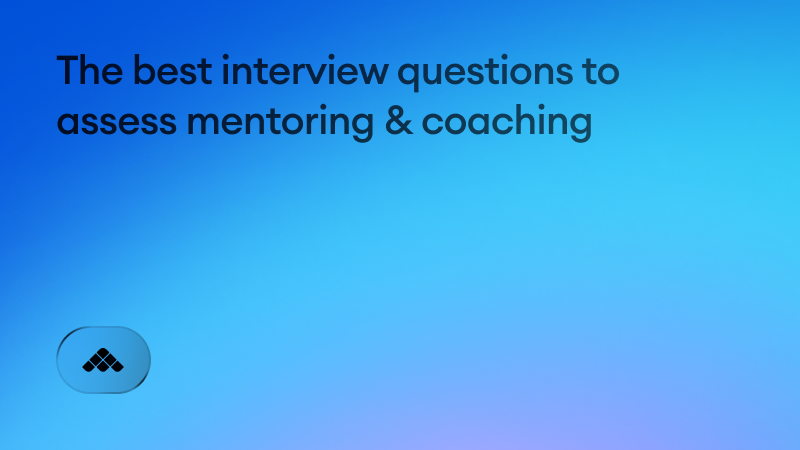Mentoring and coaching are two of the most impactful skills a candidate can bring to a team. Employees who can develop others don’t just deliver on their own responsibilities, they elevate the performance of everyone around them.
For recruiters and hiring managers, evaluating mentoring and coaching skills is essential to building resilient, high-performing teams. Effective mentoring and coaching are crucial for fostering employee growth, enhancing team performance, and driving organizational success.
In this guide, we’ll cover what mentoring and coaching mean, why they matter, and how to assess them effectively in interviews. You’ll also find a set of targeted questions and practical evaluation tips to help you identify candidates with the potential to guide and grow others.
Key takeaways
- Mentoring and coaching are distinct but complementary skills. Mentoring provides long-term guidance, while coaching focuses on immediate development.
- Hiring for these skills benefits the whole organization. Strong mentors and coaches multiply impact by helping colleagues grow.
- Structured interviews and rubrics make assessment consistent. They ensure you recognize real potential rather than relying on vague impressions.
What are mentoring and coaching?
Mentoring and coaching are often mentioned together, but they actually serve different purposes:
- Mentoring is about long-term guidance and professional development. A mentor shares experience, offers perspective, and supports broader career growth.
- Coaching is about short-term skill-building and performance. A coach provides feedback, asks guiding questions, and helps someone improve in the moment.
Both are crucial in modern workplaces. Effective leaders can switch between mentoring and coaching depending on what their colleagues need, and candidates who demonstrate skill in both are especially valuable.
Why assess mentoring and coaching skills in interviews?
Hiring someone with mentoring and coaching skills has an exponential effect on team performance. These individuals help new hires ramp up faster, reduce management overhead, and create a culture of learning. They’re also instrumental in succession planning, ensuring that knowledge and best practices are continuously passed down.
For hiring managers, assessing these skills is a way to future-proof the team. A candidate who can mentor and coach others isn’t just filling a role, they’re raising the bar for everyone else. And that quickly compounds into long-term organizational strength.
Mentoring and coaching interview questions
These interview questions are designed to reveal how candidates guide others, provide feedback, and help colleagues grow. Use them to uncover whether a candidate has both the patience and the practical skills to support others effectively.
- How do you identify your team members’ coaching needs?
- What strategies do you use to motivate and inspire others?
- How do you balance providing guidance with allowing others to develop their own solutions?
- How do you handle a situation where a mentee is not responding well to your coaching?
- Can you describe a time when you successfully mentored or coached a colleague or team member?
- Can you provide an example of how your mentoring has positively impacted someone's career development?
- What techniques do you use to give constructive feedback?
- How do you stay updated on best practices in mentoring and coaching?
- Can you discuss a challenging mentoring relationship you’ve managed and how you overcame the difficulties?
- How do you measure the effectiveness of your coaching efforts?
What to look for in answers
Strong responses will go beyond general statements and provide clear examples of how the candidate has supported others in the past. Pay attention to their approach, the outcomes they describe, and whether they adapt their style to different individuals.
- Specificity and detail: Candidates should provide clear, detailed examples that demonstrate their mentoring and coaching experiences.
- Empathy and emotional intelligence: Look for evidence of the candidate’s ability to understand and relate to others' feelings and perspectives.
- Problem-solving skills: Candidates should showcase how they address and overcome challenges in mentoring relationships.
- Adaptability: Assess whether the candidate can tailor their coaching methods to fit different individuals and situations.
- Results-oriented: Look for tangible outcomes from their mentoring and coaching efforts, such as improved performance or career advancement of mentees.
- Communication skills: Effective mentors and coaches communicate clearly and provide actionable feedback.
- Commitment to development: Candidates should demonstrate a genuine interest in the growth and development of others.
- Self-awareness: Look for candidates who reflect on their own mentoring practices and seek continuous improvement.
Tips to evaluate mentoring and coaching during the hiring process
Asking the right questions is only half the equation. To fairly assess mentoring and coaching skills, you need to structure the evaluation process so that interviewers are aligned and consistent.
These tips help you reduce bias and capture actionable evidence.
- Assess soft skills: Evaluate the candidate’s empathy, active listening, and communication skills, as these are critical for effective mentoring and coaching.
- Look for evidence of success: Seek out measurable results or positive changes that occurred as a result of the candidate’s mentoring and coaching efforts.
- Consider cultural fit: Ensure that the candidate’s mentoring style aligns with your company’s values and culture to promote a harmonious working environment.
- Evaluate commitment to development: Determine whether the candidate actively seeks opportunities for their own growth. This indicates they value and understand the importance of mentoring and coaching.
- Role-playing scenarios: Incorporate role-playing exercises in the interview to observe how candidates handle mentoring and coaching situations in real time.
- Check references: Speak with former supervisors or mentees for insights into the candidate’s mentoring and coaching abilities, and their impact on others.
- Explore diverse experiences: Consider candidates who have mentored or coached individuals from diverse backgrounds, demonstrating their ability to handle various perspectives and needs.
Consider candidate coaching and mentoring skills closely
Mentoring and coaching skills transform good employees into great leaders and collaborators. By incorporating structured interview questions and clear evaluation rubrics, recruiters and hiring managers can identify candidates who don’t just perform well individually, but also help others thrive.
By asking targeted interview questions, understanding what to look for in responses, and employing effective evaluation techniques, you’ll identify candidates who possess the necessary skills to guide and inspire others.
Use the questions and tips in this guide to consistently evaluate mentoring and coaching ability, and you’ll be able to build teams that grow stronger with every new hire.
Need help creating exceptional interview experiences? Try Metaview for free.



